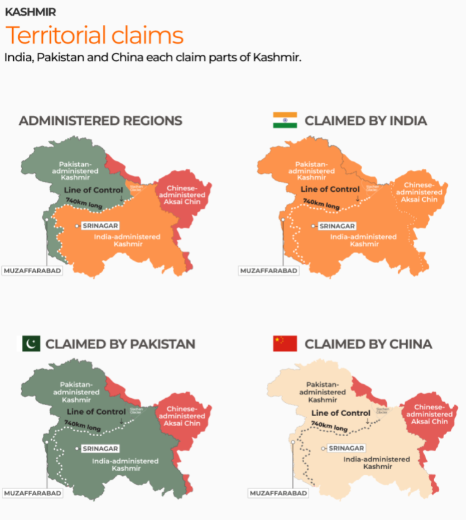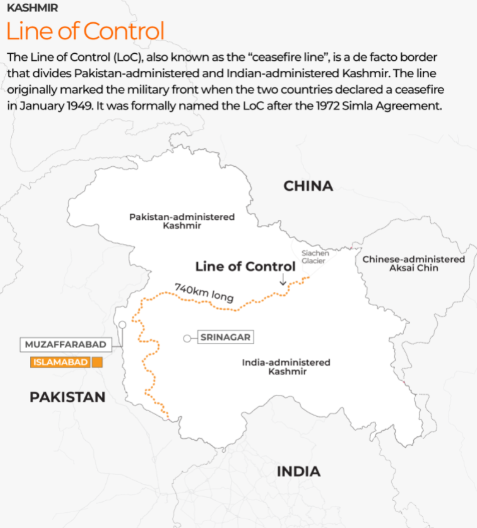Islamabad, Pakistan – Tensions between India and Pakistan have sharply increased following the April 22 attack on tourists in the scenic town of Pahalgam, located in Indian-administered Kashmir, which resulted in the deaths of at least 26 people.
In the aftermath, India held a cabinet meeting chaired by Prime Minister Narendra Modi and announced several significant measures. These include suspending the decades-old Indus Waters Treaty, which manages the shared use of the Indus River system, and plays a crucial role for both countries. India also declared the closure of its border with Pakistan, halted bilateral trade, revoked visas, and reduced the number of Pakistani diplomats stationed in the country.
In retaliation, Pakistan’s National Security Committee (NSC), the country’s top body for civil and military leadership, issued reciprocal steps. These include closing its borders and airspace to India, halting trade, and, notably, threatening to withdraw from all bilateral agreements with India, including the historic Simla Agreement.
Established in 1972, the Simla Agreement serves as a foundational framework for managing relations between India and Pakistan, particularly in regard to the Line of Control and the peaceful resolution of disputes.
Pakistan’s potential withdrawal from the agreement signals a major escalation in tensions. This raises critical questions about the nature of the Simla Agreement and the consequences of its possible suspension.
What is the Simla Agreement?
Seven months after the 1971 war, which resulted in India’s victory and the formation of Bangladesh, Pakistani President Zulfikar Ali Bhutto and Indian Prime Minister Indira Gandhi met in Shimla, the capital of the Indian state of Himachal Pradesh, to restore normal relations between the two nations.
The agreement, signed on July 2, 1972, emphasized the peaceful resolution of disputes, including the Kashmir issue, through bilateral discussions.
It also highlighted mutual respect for each country’s territorial sovereignty, political independence, and the principle of noninterference in internal affairs.
A significant outcome of the agreement was the renaming of the Ceasefire Line—the de facto border—between the two nations as the Line of Control (LoC), with both sides pledging not to alter it unilaterally.
Additionally, the agreement facilitated the release of over 90,000 Pakistani prisoners of war held by India after the conflict.
The agreement also stated that, until a final resolution of any outstanding issues is reached, neither side would take unilateral actions that could disrupt peace, and both would refrain from supporting or encouraging any activities harmful to peaceful relations.

Significance of Pakistan’s threat:
Ahmer Bilal Soofi, an expert in international law and former legal adviser to the Pakistani government, described the Simla Agreement as a temporary but vital framework governing relations between Pakistan and India. He noted that any move to suspend the agreement would require a thorough internal review by Pakistan to ensure it aligns with the country’s strategic interests. According to him, such a step demands careful and comprehensive consideration.
Another legal scholar, Muhammad Mushtaq Ahmad from Shifa Tameer-e-Millat University, pointed out that India has consistently viewed the Simla Agreement as overriding earlier United Nations Security Council resolutions. He explained that India sees the Kashmir issue as a bilateral matter, leaving no room for international mediation.
The Kashmir region has remained a major source of conflict between the two countries since their independence in 1947. Both nations control parts of the territory but claim it in its entirety. Over the years, they have fought four wars, three of which were directly related to Kashmir.
Pakistan, however, interprets the Simla Agreement as reinforcing the need for a peaceful, diplomatic solution in line with international resolutions. After India revoked the special status of Jammu and Kashmir in 2019, Pakistan accused India of violating the agreement, potentially giving Pakistan grounds to reconsider its commitment to it.
Ahmad suggested that Pakistan could invoke the Vienna Convention on the Law of Treaties, which it has ratified, to justify such a move. The convention allows a signatory to withdraw from a treaty if there has been a significant breach, although India is not a party to the convention.
Indian defence analyst Ajai Shukla warned that if either side abandons the agreement, it could lead to instability along the Line of Control (LoC). Without a binding treaty, both sides might feel free to alter the status quo, potentially escalating tensions and increasing the likelihood of armed conflict.
Does Suspending the Simla Agreement Signal a Move Toward War?
Despite the existence of the Simla Agreement, India and Pakistan have continued to engage in military confrontations, including the prolonged struggle over the Siachen Glacier — known as the highest battlefield in the world — and the 1999 Kargil conflict. According to academic Muhammad Mushtaq Ahmad, the Line of Control (LoC) has never truly been effective in securing lasting peace between the two nations.

Pakistani constitutional expert Rida Hosain has stated that India has historically taken advantage of the Simla Agreement to serve its own interests. She emphasized that while the core principle of the agreement is peaceful coexistence, recent aggressive rhetoric and unsubstantiated accusations from India contradict that spirit. Her comments referred to India’s claim that Pakistan was behind the Pahalgam attack, a charge Islamabad has denied while urging India to present proof and calling for an impartial investigation into the incident.
Meanwhile, Indian defence analyst Ajai Shukla, a former army officer, remarked that if Pakistan were to withdraw from the Simla Agreement, it would not automatically trigger a war. However, he cautioned that such a move would remove a key legal framework restraining both countries, increasing the risk of escalation and bringing them closer to open military confrontation.
Understanding Pakistan’s Rationale:
Unlike its swift action on other retaliatory steps, Pakistan has so far only issued warnings about withdrawing from the Simla Agreement rather than taking concrete steps to do so.
Legal expert Ahmer Bilal Soofi explained that Pakistan’s hesitation is tied to its broader aim of re-engaging with international mechanisms. He noted that India has consistently argued the Kashmir dispute is a bilateral matter based on the Simla Agreement. By suspending the agreement, Pakistan could reopen the door to international involvement in the issue.
Defence analyst Ajai Shukla pointed out that ending the agreement could give both countries more flexibility to assert their positions along the Line of Control (LoC), something not possible while the agreement remains in force. He added that Pakistan has often viewed the agreement as a limitation, particularly in areas like Siachen, where it accuses India of violating the pact. In 1984, India took control of the Siachen Glacier in a military operation that Pakistan has long claimed breached the terms of the agreement.
India, too, feels constrained by the agreement, according to Shukla. New Delhi continues to claim Pakistan-administered Kashmir as its own, and under the current government, calls to reclaim it through military means have intensified.
Shukla concluded that both nations increasingly believe the agreement no longer serves their national interests.
Meanwhile, legal scholar Muhammad Mushtaq Ahmad argued that India’s recent actions related to the Indus Waters Treaty could already be viewed as aggressive under international law, potentially justifying defensive responses from Pakistan. The treaty divides river usage between the two countries, with India receiving waters from some rivers and Pakistan from others. Ahmad emphasized that the disruption of this water sharing affects millions of lives in Pakistan and could be considered a hostile move.
He added that Pakistan’s warning to exit the Simla Agreement was a calculated step by its government, meant to serve as a serious reminder to India.
For more current events, visit share4all.cc or gag4all.com



















5 Comments